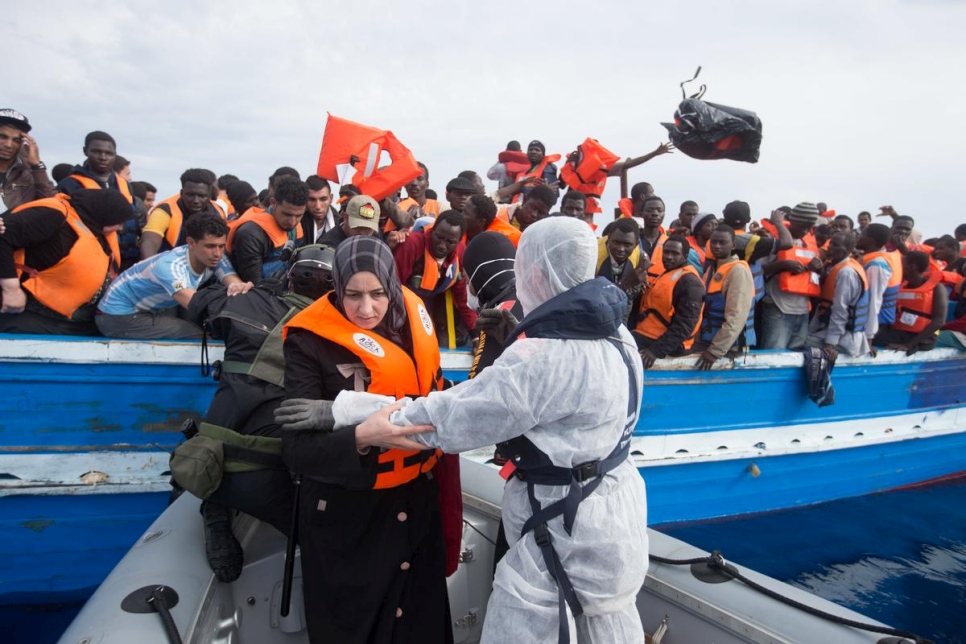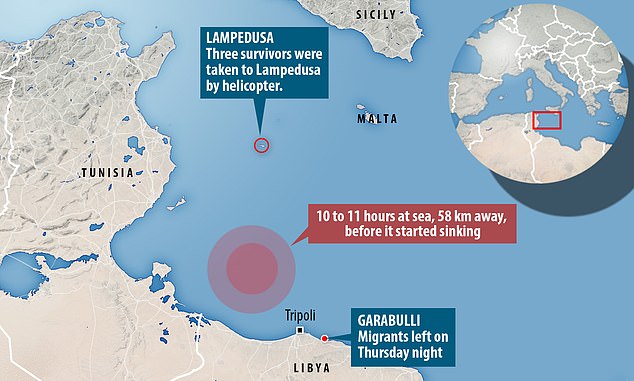Just published on Impakter:
Two days ago, 117 people died in the Mediterranean. People talk of massacres whenever migrants drown. And then forget about it, overwhelmed by the relentless news cycle of our digital age. Perhaps if we called a spade a spade, people wouldn’t forget: Murderers at work in the Mediterranean is a better description of what happened.
Consider the facts. They had been 120 when they escaped from Libya in hope of a better life in Europe. Then, after about eleven hours of navigation, their overloaded rubber dinghy deflated and capsized. They tried to swim for hours, but most couldn’t make it. There were ten women among them, one was pregnant. And there were two children, one of which was a two-month baby. Most of them came from Nigeria, Cameroon, Gambia, Ivory Coast and Sudan. Three survived to tell the story and were brought by helicopter to the Italian island of Lampedusa.
All the others could have been saved but weren’t.
With modern satellite technology, any boat crossing the Mediterranean can be spotted. For years, the Italian navy did a magnificent job of spotting them and saving lives, earning people’s gratitude and admiration across the world.

Salvini has made his policy crystal clear: He has closed Italian ports and accuses NGOs of playing the game of human traffickers, saying: “As long as European ports will remain open...sea traffickers will continue to do business and kill people.”
This causes an excruciating moral dilemma. People are killed anyway, closing ports and looking the other way is no solution. There are ways to stop "sea traffickers". For example, one could work out agreements with governments on the southern coast of the Mediterranean - especially with Libya and Turkey - to gain control and police the areas where the traffickers actually operate - and not in the open sea, when it's too late. But Salvini is doing none of this.

For example, exactly two days after 117 people were left to die, one of the ships of the NGO Sea Watch saved 47 migrants including 8 unaccompanied children. These were migrants in similar circumstances, clinging to a sinking dinghy. They were found by Sea Watch in international waters north of Zuwarah in Libya. Who will take them in?
A few days earlier, in another angle of the Mediterranean, in the western sea of Alboan, another 53 people had died in similar circumstance, with only one survivor - a fact documented by UNHCR.
This brings the total for this month to 170 deaths from drowning. A lot of deaths in just a few days.
The overall number of people who died crossing the Mediterranean in 2018 was, according to UNHCR, 2,262. Too much, even if we are far from the peak of 2015 when German Chancellor Angela Merkel famously opened the doors of Germany to a “million refugees”. UNHCR’s data speaks volumes:
UNHCR tweeted dismay at the latest tragedy:
The President of Italy Sergio Mattarella was also moved to issue a press release expressing his "profound sorrow for the death of over one hundred people, including women, men and children".
The only one who remained silent was Salvini.
Yet, his policy of closing borders is putting him at odds with international law, in particular, the principle of “non refoulement” ( a French term, in deference to the fact that French has been traditionally the language of international diplomacy) - as explained in this UNHCR video:
...
The rest , including UNHCR's excellent video, is on Impakter. To read, click here.
Two days ago, 117 people died in the Mediterranean. People talk of massacres whenever migrants drown. And then forget about it, overwhelmed by the relentless news cycle of our digital age. Perhaps if we called a spade a spade, people wouldn’t forget: Murderers at work in the Mediterranean is a better description of what happened.
Consider the facts. They had been 120 when they escaped from Libya in hope of a better life in Europe. Then, after about eleven hours of navigation, their overloaded rubber dinghy deflated and capsized. They tried to swim for hours, but most couldn’t make it. There were ten women among them, one was pregnant. And there were two children, one of which was a two-month baby. Most of them came from Nigeria, Cameroon, Gambia, Ivory Coast and Sudan. Three survived to tell the story and were brought by helicopter to the Italian island of Lampedusa.
All the others could have been saved but weren’t.
With modern satellite technology, any boat crossing the Mediterranean can be spotted. For years, the Italian navy did a magnificent job of spotting them and saving lives, earning people’s gratitude and admiration across the world.

In the Photo: An over-crowded boat of refugees and migrants is rescued in the Mediterranean by the Italian Navy as part of the Mare Nostrum operation. Source: © Massimo Sestini for the Italian Navy
But with far-right populist leader Matteo Salvini in charge (he is Italy’s Interior Minister), all that has changed. Of course, we have no proof that the Italians watched as people drowned. Only one thing is certain: These people fought for hours in freezing waters before going under.Salvini has made his policy crystal clear: He has closed Italian ports and accuses NGOs of playing the game of human traffickers, saying: “As long as European ports will remain open...sea traffickers will continue to do business and kill people.”
This causes an excruciating moral dilemma. People are killed anyway, closing ports and looking the other way is no solution. There are ways to stop "sea traffickers". For example, one could work out agreements with governments on the southern coast of the Mediterranean - especially with Libya and Turkey - to gain control and police the areas where the traffickers actually operate - and not in the open sea, when it's too late. But Salvini is doing none of this.

MAP showing where the rubber dinghy with 120 people aboard sank. Source: Mail Online
For now, the situation is in an ugly stall. Countries (like Italy) that should welcome refugees are not doing so. And putting themselves in the unwanted role of murderers at sea.For example, exactly two days after 117 people were left to die, one of the ships of the NGO Sea Watch saved 47 migrants including 8 unaccompanied children. These were migrants in similar circumstances, clinging to a sinking dinghy. They were found by Sea Watch in international waters north of Zuwarah in Libya. Who will take them in?
A few days earlier, in another angle of the Mediterranean, in the western sea of Alboan, another 53 people had died in similar circumstance, with only one survivor - a fact documented by UNHCR.
This brings the total for this month to 170 deaths from drowning. A lot of deaths in just a few days.
The overall number of people who died crossing the Mediterranean in 2018 was, according to UNHCR, 2,262. Too much, even if we are far from the peak of 2015 when German Chancellor Angela Merkel famously opened the doors of Germany to a “million refugees”. UNHCR’s data speaks volumes:
UNHCR tweeted dismay at the latest tragedy:
“We cannot turn a blind eye to the high numbers of people dying on Europe’s doorstep.”— UNHCR, the UN Refugee Agency (@Refugees) January 20, 2019
~ @cochetelhttps://t.co/wJ7yVHbxH6
The President of Italy Sergio Mattarella was also moved to issue a press release expressing his "profound sorrow for the death of over one hundred people, including women, men and children".
The only one who remained silent was Salvini.
Yet, his policy of closing borders is putting him at odds with international law, in particular, the principle of “non refoulement” ( a French term, in deference to the fact that French has been traditionally the language of international diplomacy) - as explained in this UNHCR video:
...
The rest , including UNHCR's excellent video, is on Impakter. To read, click here.


Comments